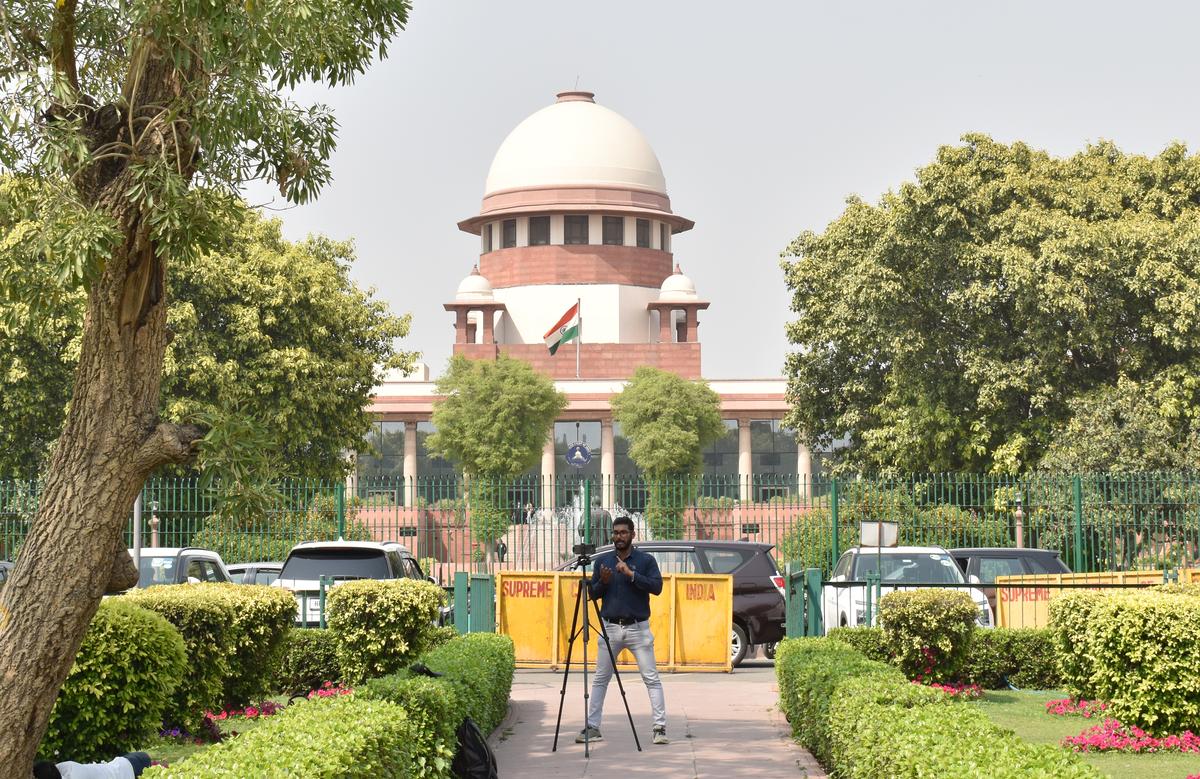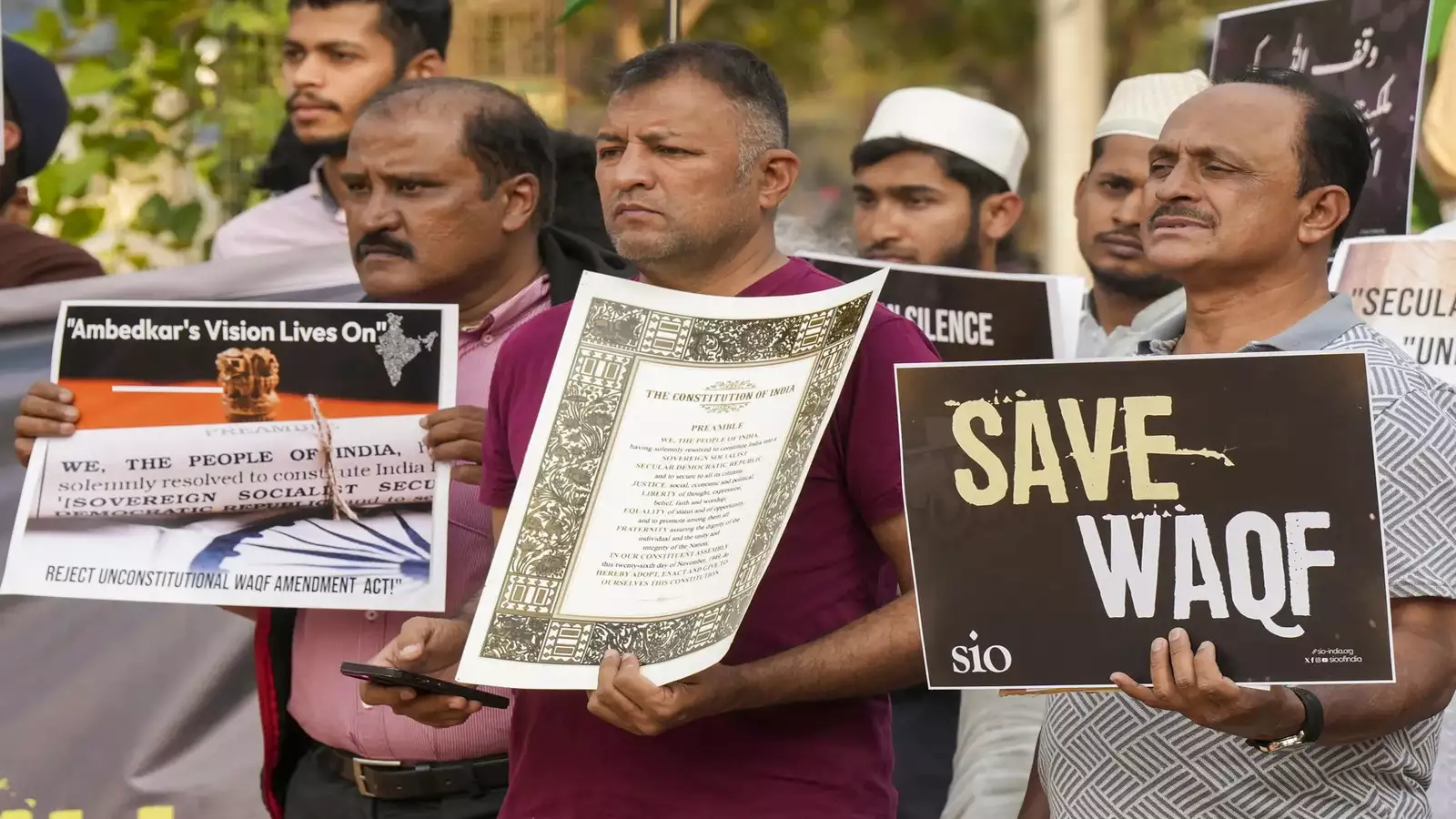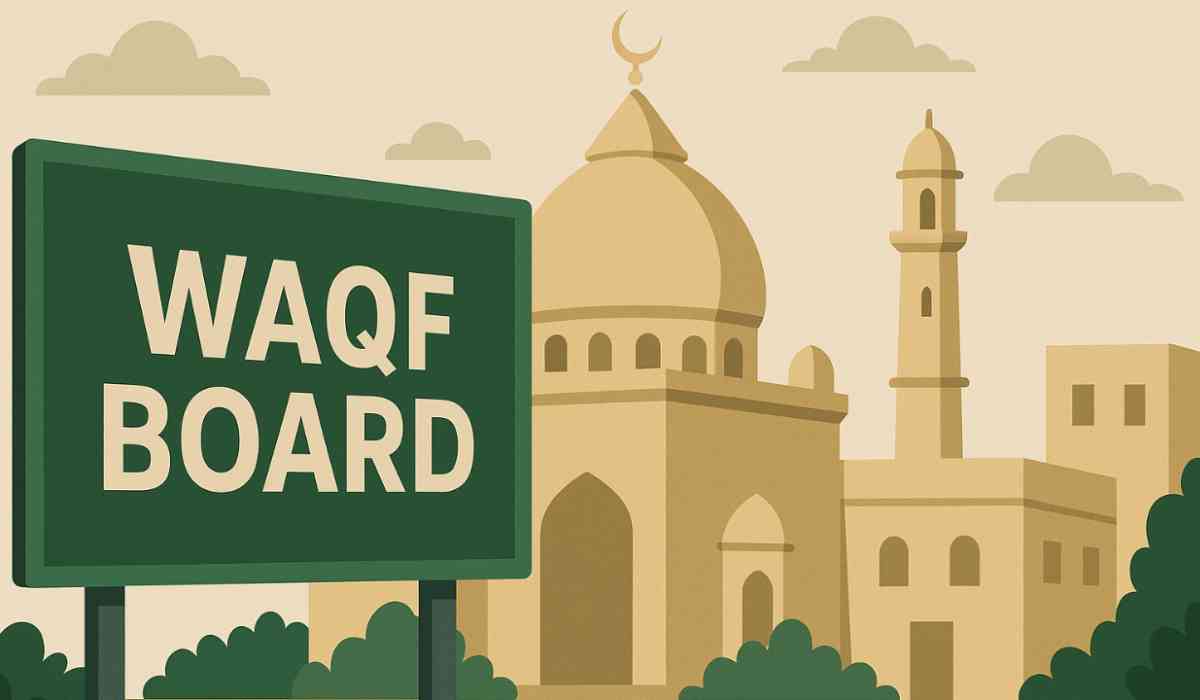The Supreme Court of India on April 16, 2025, began hearing a massive batch of 73 petitions challenging the constitutional validity of the Waqf (Amendment) Act, 2025, a controversial law that has triggered a legal, political, and religious firestorm across the country.
The hearing, which began at 2 PM, is being conducted by a three-judge bench led by Chief Justice of India Sanjiv Khanna, along with Justices Sanjay Kumar and KV Viswanathan.

Background: What Is the Waqf (Amendment) Act, 2025?
The Waqf (Amendment) Act, 2025 was passed by Parliament and signed into law by President Droupadi Murmu on April 5, 2025. According to the Central Government, the law aims to introduce transparency, accountability, and efficiency in the administration of Waqf properties.
However, it has faced strong opposition from various political parties, religious organisations, civil rights groups, and individuals, who allege that it violates constitutional rights, disrupts religious autonomy, undermines Waqf institutions, and facilitates executive overreach into religious property.
Composition of the Bench and Procedural Clarifications
-
The hearing is presided over by a bench consisting of CJI Sanjiv Khanna, Justice Sanjay Kumar, and Justice KV Viswanathan.
-
During the hearing, CJI Khanna clarified that all matters cleared by the Registry by 11 AM on April 16 would be listed for hearing the same day.
-
A counsel appearing for one of the petitioners raised a concern that their matter, though numbered, was not listed. CJI Khanna responded with the registry timeline clarification.
-
The Central Government has filed a caveat in the Supreme Court, requesting that it be heard before any interim relief is granted to petitioners.
Who Are the Petitioners?
The wide range of petitioners underscores the breadth of opposition to the Waqf Amendment Act. The 73 petitions include submissions from:
Political Leaders:
-
Asaduddin Owaisi – AIMIM MP
-
Md Jawed – Congress MP
-
Manoj Kumar Jha – RJD MP
-
Faiyyaz Ahmad – RJD MP
-
Mahua Moitra – TMC MP
-
Zia Ur Rehman – SP MP
-
Amanatullah Khan – AAP MLA
-
Mohammad Hamdullah Sayeed – Congress MP from Lakshadweep
-
TVK President & Tamil actor Vijay, who is represented by Senior Advocate Abhishek Manu Singhvi
Religious Organisations:
-
All India Muslim Personal Law Board
-
Jamiat Ulema-i-Hind, led by Maulana Arshad Madani
-
Samastha Kerala Jamiatul Ulema
-
Association for Protection of Civil Rights
-
Imam of Jama Masjid, Bengaluru
Opposition Political Parties:
-
Congress
-
Trinamool Congress (TMC)
-
Communist Party of India (CPI)
-
Dravida Munnetra Kazhagam (DMK)
-
Indian Union Muslim League
-
AIMIM
-
YSR Congress Party (YSRCP)
-
Samajwadi Party (SP)
-
Janata Dal (United)
-
Tamizhaga Vetri Kazhagam (TVK)
Hindu Petitioners:
-
Hari Shankar Jain – Advocate
-
Parul Khera – Resident of Noida
Jain has alleged that the Act allows Muslims to "illegally take over government and Hindu religious lands", raising concerns beyond the Muslim community.

Minority Community Petitioners Raise Unique Constitutional Concerns
A notable petition has been filed by Mohammad Hamdullah Sayeed, the MP from Lakshadweep. He contests Section 3E of the Act on the grounds that it forces Scheduled Tribe Muslims like him into a false binary between their tribal and religious identities, violating Articles 14, 25, 26, and 300A of the Constitution.
Similarly, Daya Singh, a Sikh and president of Gurdwara Singh Sabha in Gurgaon, has moved the court against the law, arguing that it infringes his right to make charitable endowments across religious boundaries—a practice intrinsic to Sikh values.
Registry-Related Grievances
One counsel appearing before the court complained that although his petition had been numbered, it was not listed. CJI Sanjiv Khanna clarified that all matters cleared by the Registry by 11 AM on April 16 would be taken up for hearing that afternoon.
Key Constitutional and Legal Challenges to the Act
Petitioners have raised a range of constitutional, legal, religious, and social concerns, including:
-
Changes to Waqf Board Elections: The amendment removes elections to Waqf boards, replacing them with appointed members, which opponents argue undermines the democratic and representative structure of these boards.
-
Inclusion of Non-Muslims in Waqf Boards: The Act allows non-Muslims to be appointed to Waqf boards, sparking fears that this could infringe on the Muslim community's right to manage its own religious affairs.
-
Redefinition of ‘Waqf’: The concept of 'Waqf by user,' a doctrine developed by Indian courts, has been removed, which critics say weakens the protection of Waqf properties and potentially threatens heritage sites.
-
Executive Control: Critics argue that the law gives excessive control to the government, which could lead to arbitrary interference in Waqf administration and the confiscation of Waqf lands.
-
Documentation of Waqf Properties: The Act mandates that all Waqf properties be documented and registered on an online portal every six months. This provision has been criticized for placing unnecessary burdens on religious properties without adequate safeguards for religious communities. Properties without formal documentation or created via oral dedication may lose Waqf status.
-
Heritage and Religious Site Vulnerability: Ancient and historic Waqf properties are seen as being at risk of declassification and takeover.
-
Denial of Rights to Scheduled Tribes: Section 3E is challenged as forcing Scheduled Tribe Muslims into a false binary between tribal and religious identity. Mohammad Hamdullah Sayeed argues this violates:
-
Article 14 (Right to Equality)
-
Article 25 (Freedom of Religion)
-
Article 26 (Freedom to manage religious affairs)
-
Article 300A (Right to Property)
-

Actor Vijay’s Involvement Adds Pop Culture Angle
In a headline-making development, popular Tamil actor Vijay, now the president of the newly formed political outfit TVK (Tamizhaga Vetri Kazhagam), has also filed a petition. He is being represented by Senior Advocate Abhishek Manu Singhvi, adding both legal and public relations heft to the case. Vijay's entry into the political-legal battle has drawn attention to the law's broader implications beyond the Muslim community.
International Reactions
While the controversy has been largely confined to India, Pakistan’s comments on the Waqf Amendment Act have added an international dimension. The Ministry of External Affairs (MEA) strongly rejected Pakistan’s remarks, calling them "baseless" and "motivated." MEA spokesperson Randhir Jaiswal emphasized that the Waqf Act is an internal matter for India and that Pakistan should focus on its own human rights record.
What the States Supporting the Law Say
In a significant show of federal backing, seven states have filed intervention applications in the Supreme Court in support of the Centre:
-
Rajasthan
-
Gujarat
-
Haryana
-
Maharashtra
-
Assam
-
Uttarakhand
-
Chhattisgarh
These states argue that the Act is constitutionally valid, non-discriminatory, and essential for streamlining and improving the administration of Waqf properties. They support the central government’s stance that the law brings much-needed transparency and accountability to the management of religious endowments.
In a precautionary move, the Central Government has filed a caveat in the Supreme Court, seeking to ensure that it is heard before any interim relief is granted to the petitioners.
What’s Next in the Court?
The case is likely to see extended arguments from both sides, considering the sheer number of petitioners, the diverse legal grounds raised, and the multi-layered political, social, and religious ramifications. The Centre, having filed a caveat, is preparing to strongly defend the Act before any interim relief is considered.
Meanwhile, legal representation continues to evolve with high-profile advocates entering the fray, indicating the national significance and complexity of the litigation.
A Landmark Constitutional Battle in the Making
The Supreme Court’s hearings on the Waqf (Amendment) Act, 2025 are poised to become a landmark moment in Indian constitutional history, with ramifications that stretch from religious freedom and minority rights to property law and federal governance.
As the judiciary weighs the law’s impact on both tribal and religious identities, the case could redefine the contours of religious endowment laws, state control, and the future of pluralism in India.
With inputs from agencies
Image Source: Multiple agencies
© Copyright 2025. All Rights Reserved Powered by Vygr Media.


















